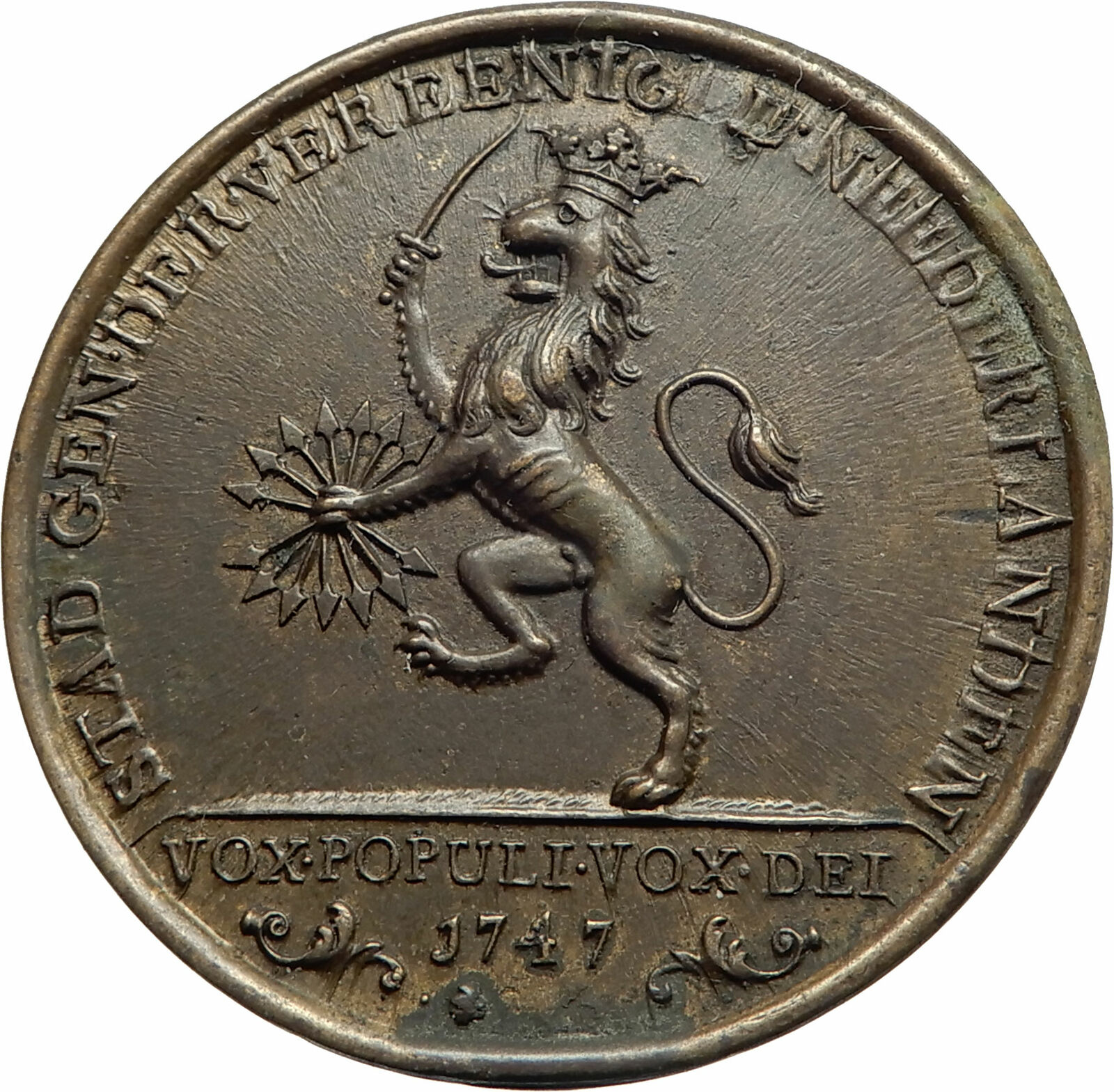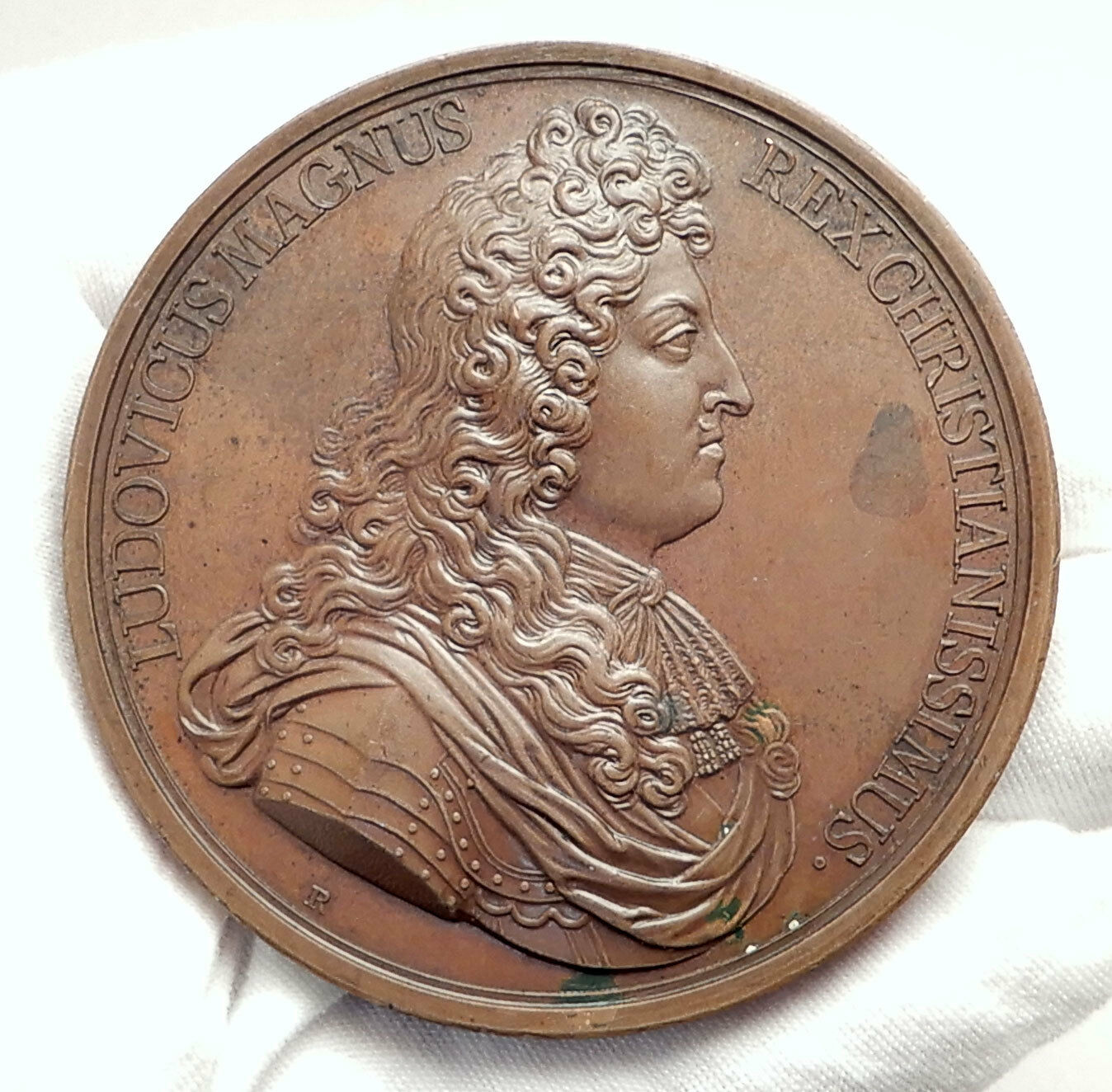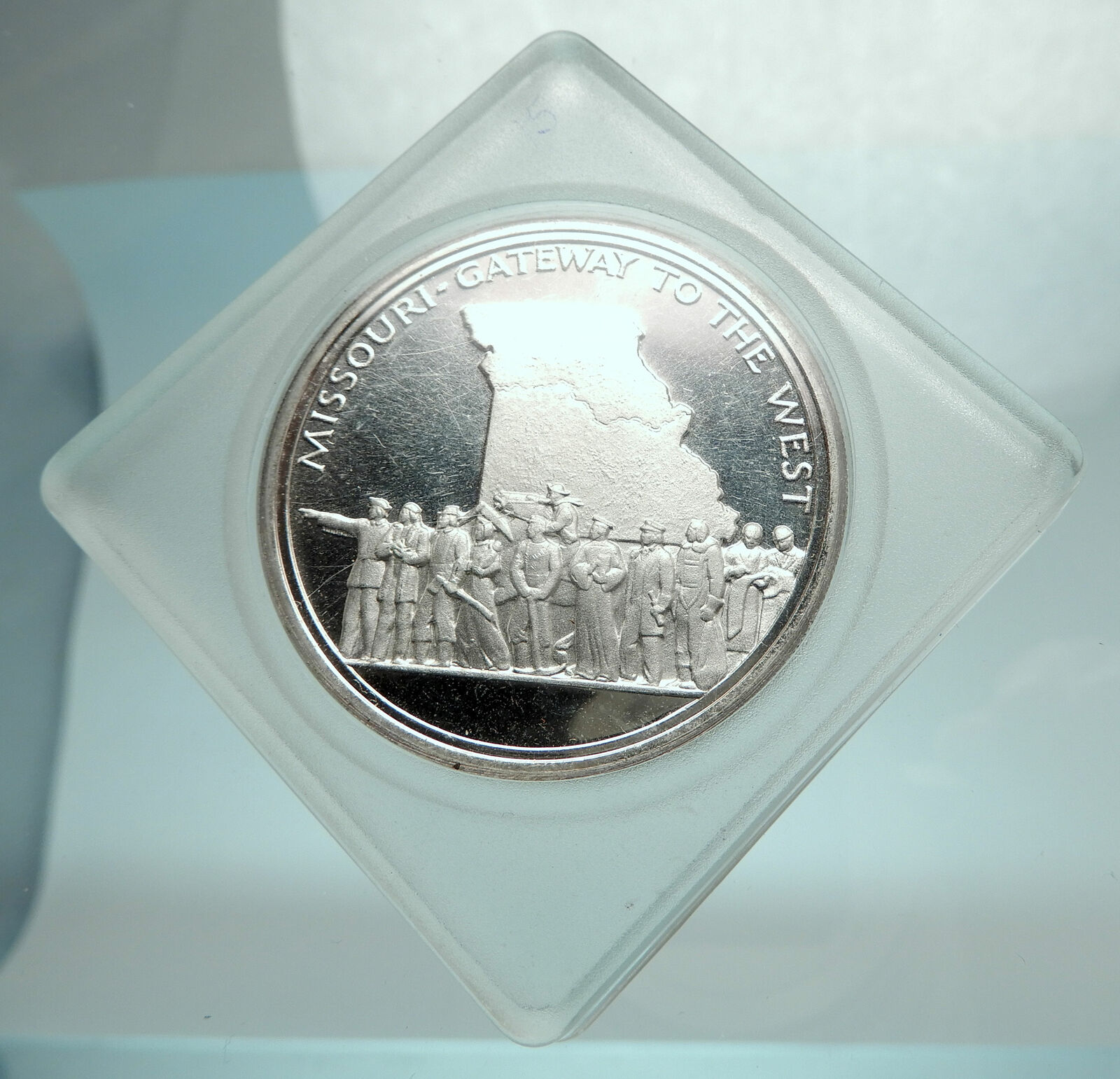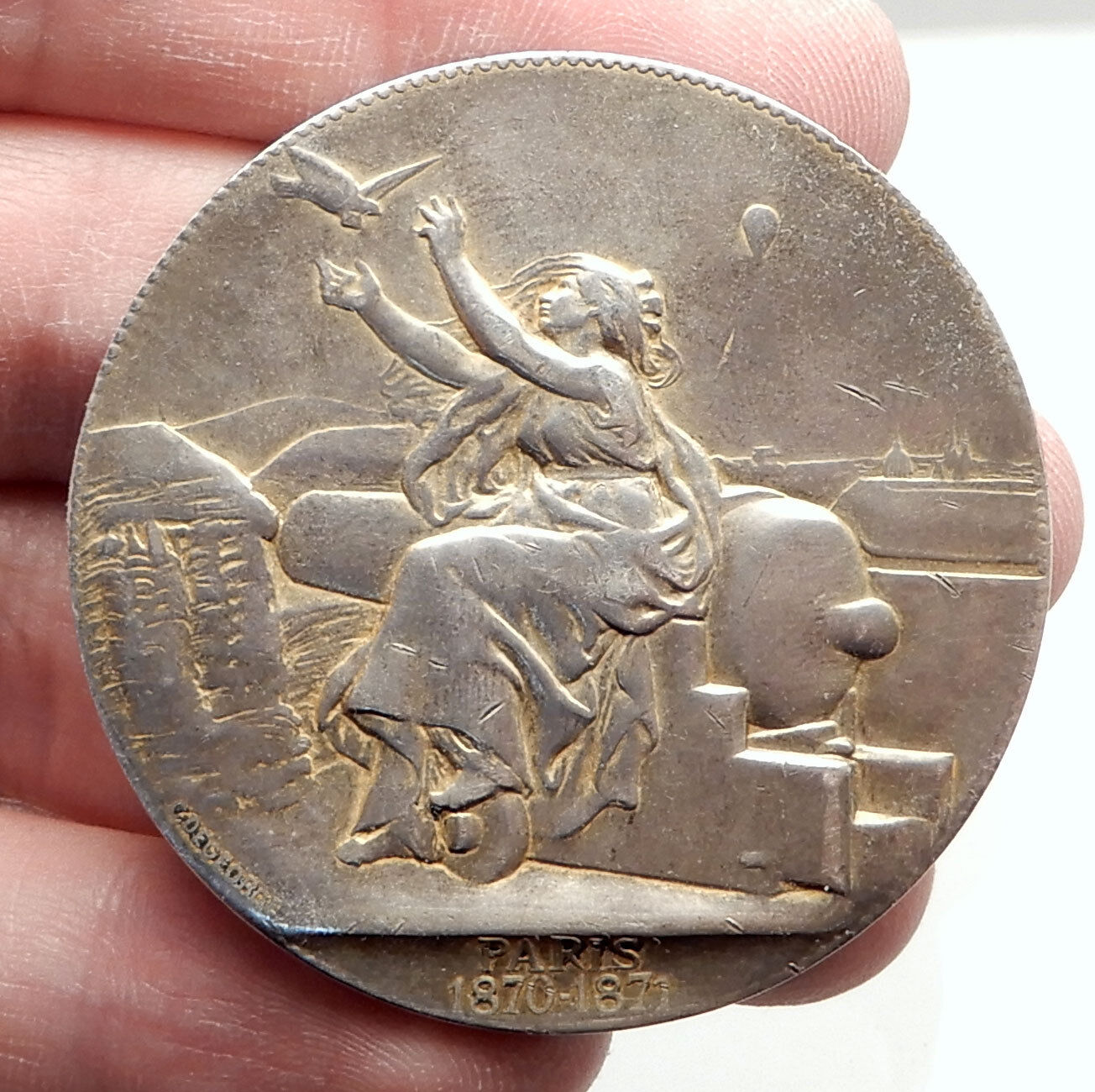|
France – Agriculture of Bourges
1897 Bronze Medal 50mm (55.80 grams)
Reference: Cf N# 216376 Engraver: Hubert Ponscarme
REPUBLIQUE FRANCAISE H. PONSCARME, Winged liberty head left, star atop.
MINISTRE DE L’AGRICVLTVRE BOURGES 1897 CONCOURS REGAL AGRLE H.PONSCARME, Inscribed plaque atop caduceus amid flora.
Edge Lettering:
BRONZE
You are bidding on the exact item pictured, provided with a Certificate of Authenticity and Lifetime Guarantee of Authenticity.
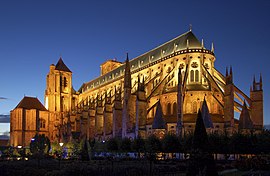
Bourges is a commune in central France on the river Yèvre. It is the capital of the department of Cher, and also was the capital city of the former province of Berry.
The name of the commune derives either from the Bituriges, the name of the original inhabitants, or from the Germanic word Burg (French: bourg. Spanish: burgo. English, others: burgh, berg, or borough), for “hill” or “village”. The Celts called it Avaricon; Latin-speakers: Avaricum. In the fourth century BC, as in the time of Caesar, the area around it was the center of a Gallic (Celtic) confederacy.
In 52 BC, the sixth year of the Gallic Wars, while the Gauls implemented a scorched-earth policy to try to deny Caesar’s forces supplies, the inhabitants of Avaricum begged not to have their town burned.[citation needed] It was temporarily spared due to its good defences provided by the surrounding marshes, by a river that nearly encircled it, and by a strong southern wall. Julius Caesar’s forces, nevertheless, captured and destroyed the town, killing all but 800 of its inhabitants.[citation needed]
Rome reconstructed Avaricum as a Roman town, with a monumental gate, aqueducts, thermae and an amphitheatre; it reached a greater size than it would attain during the Middle Ages. The massive walls surrounding the late-Roman town, enclosing 40 hectares, were built in part with stone re-used from earlier public buildings.
The third-century AD Saint Ursinus, also known as Saint Ursin, is considered[by whom?] the first bishop of the town. Bourges functions as the seat of an archbishopric. During the 8th century Bourges lay on the northern fringes of the Duchy of Aquitaine and was therefore the first town to come under Frankish attacks when the Franks crossed the Loire. The Frankish Charles Martel captured the town in 731, but Duke Odo the Great of Aquitaine immediately re-took it. It remained under the rule of counts who pledged allegiance to the Aquitanian dukes up to the destructive siege by the Frankish King Pepin the Short in 762, when Basque troops are found defending the town along with its count.
During the Middle Ages, Bourges served as the capital of the Viscounty of Bourges until 1101. In the fourteenth century, it became the capital of the Duchy of Berry (established in 1360). The future king of France, Charles VII (r. 1422–1461), sought refuge there in the 1420s during the Hundred Years’ War. His son, Louis XI, was born there in 1423. In 1438, Charles VII decreed the Pragmatic Sanction of Bourges. During this period, Bourges was a major centre of alchemy.[citation needed]
The Gothic Cathedral of Saint Étienne, begun at the end of the twelfth century, ranks as a World Heritage Site. It is considered[by whom?] one of the earliest examples of the High Gothic style of the thirteenth century.[3]
Bourges has a long tradition of art and history. Apart from the cathedral, other sites of importance include the 15th-century Palais Jacques Cœur and a sixty-five-hectare district of half-timbered houses and fine town-houses.
  France, officially the French Republic (French: République française), is a sovereign state comprising territory in western Europe and several overseas regions and territories. The European part of France, called Metropolitan France, extends from the Mediterranean Sea to the English Channel and the North Sea, and from the Rhine to the Atlantic Ocean. France spans 640,679 square kilometres (247,368 sq mi) and has a total population of 67 million. It is a unitary semi-presidential republic with the capital in Paris, the country’s largest city and main cultural and commercial centre. The Constitution of France establishes the state as secular and democratic, with its sovereignty derived from the people. France, officially the French Republic (French: République française), is a sovereign state comprising territory in western Europe and several overseas regions and territories. The European part of France, called Metropolitan France, extends from the Mediterranean Sea to the English Channel and the North Sea, and from the Rhine to the Atlantic Ocean. France spans 640,679 square kilometres (247,368 sq mi) and has a total population of 67 million. It is a unitary semi-presidential republic with the capital in Paris, the country’s largest city and main cultural and commercial centre. The Constitution of France establishes the state as secular and democratic, with its sovereignty derived from the people.
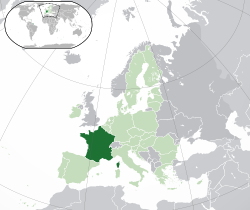
During the Iron Age, what is now Metropolitan France was inhabited by the Gauls, a Celtic people. The Gauls were conquered in 51 BC by the Roman Empire, which held Gaul until 486. The Gallo-Romans faced raids and migration from the Germanic Franks, who dominated the region for hundreds of years, eventually creating the medieval Kingdom of France. France emerged as a major European power in the Late Middle Ages, with its victory in the Hundred Years’ War (1337 to 1453) strengthening French state-building and paving the way for a future centralized absolute monarchy. During the Renaissance, France experienced a vast cultural development and established the beginning of a global colonial empire. The 16th century was dominated by religious civil wars between Catholics and Protestants (Huguenots).
France became Europe’s dominant cultural, political, and military power under Louis XIV. French philosophers played a key role in the Age of Enlightenment during the 18th century. In 1778, France became the first and the main ally of the new United States in the American Revolutionary War. In the late 18th century, the absolute monarchy was overthrown in the French Revolution. Among its legacies was the Declaration of the Rights of Man and of the Citizen, one of the earliest documents on human rights, which expresses the nation’s ideals to this day. France became one of modern history’s earliest republics until Napoleon took power and launched the First French Empire in 1804. Fighting against a complex set of coalitions during the Napoleonic Wars, he dominated European affairs for over a decade and had a long-lasting impact on Western culture. Following the collapse of the Empire, France endured a tumultuous succession of governments: the monarchy was restored, it was replaced in 1830 by a constitutional monarchy, then briefly by a Second Republic, and then by a Second Empire, until a more lasting French Third Republic was established in 1870. By the 1905 law, France adopted a strict form of secularism, called laïcité, which has become an important federative principle in the modern French society.
France reached its territorial height during the 19th and early 20th centuries, when it ultimately possessed the second-largest colonial empire in the world. In World War I, France was one of the main winners as part of the Triple Entente alliance fighting against the Central Powers. France was also one of the Allied Powers in World War II, but came under occupation by the Axis Powers in 1940. Following liberation in 1944, a Fourth Republic was established and later dissolved in the course of the Algerian War. The Fifth Republic, led by Charles de Gaulle, was formed in 1958 and remains to this day. Following World War II, most of the empire became decolonized.
Throughout its long history, France has been a leading global center of culture, making significant contributions to art, science, and philosophy. It hosts Europe’s third-largest number of cultural UNESCO World Heritage Sites (after Italy and Spain) and receives around 83 million foreign tourists annually, the most of any country in the world. France remains a great power with significant cultural, economic, military, and political influence. It is a developed country with the world’s sixth-largest economy by nominal GDP and eight-largest by purchasing power parity. According to Credit Suisse, France is the fourth wealthiest nation in the world in terms of aggregate household wealth. It also possesses the world’s second-largest exclusive economic zone (EEZ), covering 11,035,000 square kilometres (4,261,000 sq mi).
French citizens enjoy a high standard of living, and the country performs well in international rankings of education, health care, life expectancy, civil liberties, and human development. France is a founding member of the United Nations, where it serves as one of the five permanent members of the UN Security Council. It is a member of the Group of 7, North Atlantic Treaty Organization (NATO), Organisation for Economic Co-operation and Development (OECD), the World Trade Organization (WTO), and La Francophonie. France is a founding and leading member state of the European Union (EU).
|







 France, officially the French Republic (French: République française), is a sovereign state comprising territory in western Europe and several overseas regions and territories. The European part of France, called Metropolitan France, extends from the Mediterranean Sea to the English Channel and the North Sea, and from the Rhine to the Atlantic Ocean. France spans 640,679 square kilometres (247,368 sq mi) and has a total population of 67 million. It is a unitary semi-presidential republic with the capital in Paris, the country’s largest city and main cultural and commercial centre. The Constitution of France establishes the state as secular and democratic, with its sovereignty derived from the people.
France, officially the French Republic (French: République française), is a sovereign state comprising territory in western Europe and several overseas regions and territories. The European part of France, called Metropolitan France, extends from the Mediterranean Sea to the English Channel and the North Sea, and from the Rhine to the Atlantic Ocean. France spans 640,679 square kilometres (247,368 sq mi) and has a total population of 67 million. It is a unitary semi-presidential republic with the capital in Paris, the country’s largest city and main cultural and commercial centre. The Constitution of France establishes the state as secular and democratic, with its sovereignty derived from the people.


